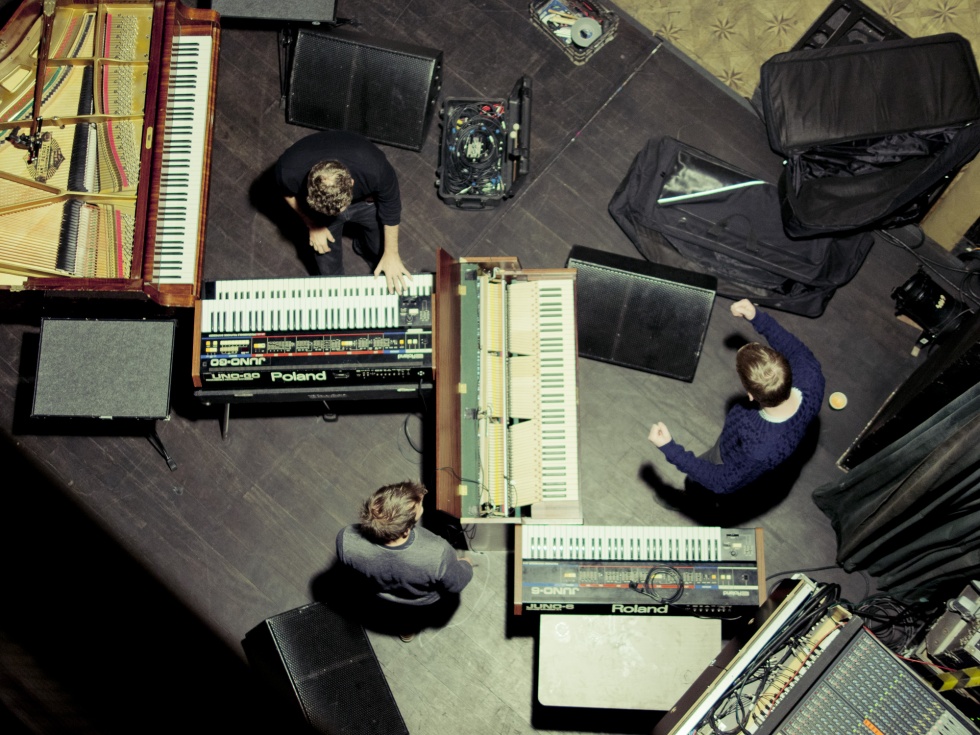
Erased Tapes Tour 2012: (From L to R) Dustin O’Halloran, Nils Frahm & Ólafur Arnalds on stage (Photo by Alexander Schneider)
From the delightful In Stereo laid down for us last week by Greg Gives Peter Space – the dubbed-out meeting of minds between Greg Haines and Peter Broderick – to the imminent return of dazzlingly talented maestro Nils Frahm onto our screens at Dimensions Festival (not to mention the forthcoming Kiasmos record in constant rotation on the office speakers), we’ve seen a lot of Erased Tapes action on Boiler Room as of late. So the timing felt spot-on to take a considerably closer look at one of our favourite independent labels.
Founded back in 2007 with the signing of Rival Consoles – who performed for us at the V&A Museum earlier this year – the label has hit a purple patch in recent years. With a stable boasting the likes of Ólafur Arnalds and A Winged Victory For The Sullen as well as the aforementioned acts to appeared on Boiler Room, Erased Tapes has quietly blossomed into an vital outpost for artists exploring the fertile ground that lies between modern classical, wistful electronica and the avant-garde, with a carefully-honed graphic aesthetic to match.
Our men Bradley Zero and Gabriel Szatan sat down with founder Robert Raths and assistant manager Sofia Ilyas for close to two hours – the most in-depth interview the label has granted in its seven-year existence. We felt it was best to remove our voice, and let them tell the Erased Tapes story in their own words.
***
On Origins & Ethos
“The label wasn’t really planned as such in the beginning, it was more like all of us helping each other out with creative ideas. Whatever was needed, I felt like we should feel that gap and help out. There was always a dialogue about how we should present music: in the early days especially Nils was very open to the idea that there was a symbiosis between these elements, and also the people who were involved. It’s not so much about ego, it’s more about the greater good or the collaborative instinct.”
“We started small, but Nils is a prime example that through touring and touring and releasing records at a constant but thoughtful pace he would be able to play small shows all over the world. And now many of our artists are playing a larger calibre of shows all over the world and it’s not out of proportion.
The instrumental nature of our sound helps with a lack of territorial restrictions, which actually makes it more free. Óli was able to play in front of a thousand people a night in China even before he touched Japan. We embrace the fact that there are people who care about this music in places that we’d never have thought about. It’s nice, too, to get to a point where the greatest strength of this music is that there’s no time stamp to it.”
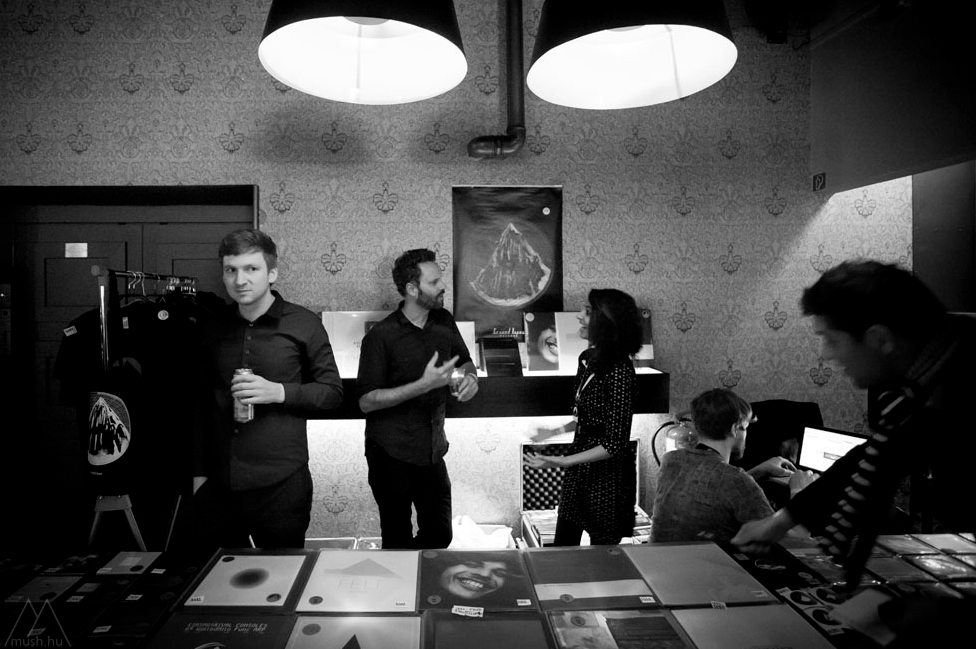
Ólafur Arnalds, Nils Frahm, Dustin O’Halloran, Sofia Ilyas & Robert Robert Raths at a merch table in Budapest; 2012
***
On Their Sound
“That term ‘neo-classical’ is ridiculous…but any term is i guess. I just have difficulty describing things like that. A car is a car, a holiday is a holiday. Pop music is pop music. I don’t have to add little tags to it.”
“We do have issues where Nils will say “Oh my record isn’t in this record store” and we’ll go there and it is, but it so happened to be that Felt is in one aisle, and Spaces another. As much as we’d love to say “No genre”, or leave everything laying about in all kinds of directions, it can cause problems. All this pigeonholing is irksome but obviously it helps.”
“It’s funny because every year we kept saying to each other, “next year’s going to be our electronic year”; everyone just goes “oh yeah, whatever…” There have been hints of an electronic influence all the way through the label history – simply because all of us love it, and we grew up with it – but then obviously by a certain point we became known to most people as more like a modern classical label.
But now we’ve been picking up bookings at festivals like Dimensions, making friends with people like Bradley, have had dub inspired projects, commissioning more remixes and exploring what we like to call “Nordic techno” with Ólafur’s long-awaited debut record under his Kiasmos project. So this last year has been a really good year for us, in terms of connections we’ve made and the ability to express how we want to be seen as a label. Finally we feel like people are starting to get us more.”
“Erased Tapes: Five Years Old!” from Erased Tapes on Vimeo.
***
On Collaboration, I: A Winged Victory For The Sullen
“The first time that we really faced the question of when a side project becomes less of a mere project’, was with A Winged Victory For The Sullen, which was Dustin O’ Halloran and Adam Wiltzie from Stars of the Lid. From the off Adam had said, “if we were to give this to one of our labels, it’d just be a side project and if we give it to someone like you it’d probably be something new”. They were both great in their fields and known for a certain sound – so that they can let go of their solo successes and just do everything that’s needed for a project to flourish and grow, that’s really great.”
“My first experience with Adam came about when he was shouting at me [Robert] for putting up an Ólafur Arnaulds poster at a Johan Johansson show. He was furious at me and pulling it down like “what the fuck!” He was ready to throw a punch – and I mean really ready!
Anyways, we ended up in a hotel lobby, drinking whiskey, and he gave Dustin a ring and started introducing the project to me: saying both were going through heavy breakups, and together they had a catalyst for making this music. I very much felt like that I needed to be involved with these two guys because what they were doing was so natural and great; that it needed a home.”
“Merely thinking of which artists could in theory collaborate together, that feels really cold and calculated. Our task is similar to what Nils does when he improvises on the piano. There are happy accidents but there’s also this sort of split second where you realise those key accidents are happening and you need to help facilitate or nurture them. You can lead a horse to water, but you can’t make her drink.”
***
On Collaboration, II: Greg Gives Peter Space
“They’ve known each other for a long time, and are very close friends. Strangely they only began to jam together after Peter moved to Portland, getting together each time he came back. But whilst they were living virtually next door together in Berlin they’d do nothing. It’s funny in a way. Terrible and funny at the same time.”
“Very early on people decided that Peter was the next big thing in neo-classical music, but that simply wasn’t what he wanted — he just wanted to experiment. He wanted to do something dub and not be criticised for it because it wasn’t a continuation of the neo-classical album he’d released. As great as it was with him touring the world with Efterklang and living in Europe, he definitely feels a lot happier now that he returned home. At 25 or 26, he’s still so young too.”
“Had Peter told anyone else that they were working on something involving “spacey dub sounds”, I’m sure they would’ve rolled their eyes, but we were clawing at him to hear it. It feels like it truly is the right time for these collaborations: Óli and Janus making a record as Kiasmos that we couldn’t be prouder of, the same with Greg and Peter. Plus, Nils mastered it, too; he masters most of our releases in fact. So there’s a further spirit of harmony there.”
“From a young age he was trained by a very strict Russian pianist, so playing piano became a form of restriction even though he naturally enjoyed it. His teenage years allowed him to break out of that. He had a natural progression, making crazy experimental electronic music, before coming back round the other way to classical once more.”
“There was a particular time in Berlin where he played a small show and all of a sudden a synthesiser was placed on stage, and there was a spark in the air. That freeform bubbling – something that had a history based in synth sound of the 70s – became the opening sound of “Says”. It was more like Nils introducing that as a part of him, a natural element of his sound.
Having people come to the merch stand to ask what piece he played second to last and having to answer “I kind of know that one but to be honest with you it’s more of an improvised medley” and then having these people just stare at you and then go “oh, okay” and walk away. That was a…bit of a shame. [Laughter]”
***
On Nils, I: Formative Electronic Experiences
“I remember Jon Hopkins sitting in the studio, and saying “Man, I really like this electronic track Nils did, it’s amazing.” It was a year old remix he had done for Peter up on our Soundcloud, sort of gathering dust. It was great that he got so much out of it. Just like, “wow – the way the electronics create this sort of cushion for Peter and his voice, that’s what I want to do!” Shortly after he played on the King Creosote project, which was in a similar vein.”
This was around a period of touring where Four Tet would put one of Nils’ synthesiser tracks at the end of his DJ set nearly every night, played from a 7” vinyl! Kieran even made this bold statement on his Twitter saying something along the lines of “No one should remix this. It’s a masterpiece the way it is”. All these remixers we had commissioned sort of chickened out! But he gave everyone – especially Nils and ourselves – the belief that a solo synthesizer track doesn’t need a beat.”
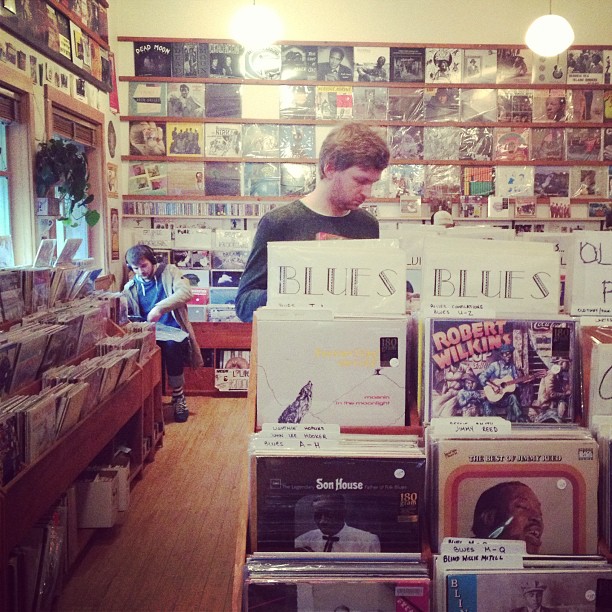
Nils Frahm and Ólafur Arnalds record shopping at Mississippi Records in Portland
***
On Nils, II: Live Landmarks
“That Boiler Room session gave him so much confidence. We were in Berlin for a couple of years before then when Boiler Room was beginning to really generate buzz, plus peering at posters, and wonder why our label wasn’t being selected for these kind of things. Sessions like that are just as important as anything else is to us. It showed that people do react to the electronic side of his music, allowing him to push onto what he’s now doing with more drum machines and the Moog Taurus that he’s using. It was a huge thing having him at Mutek, and having him again at Dimensions at this next stage of his career.”
“We threw a night with The Hydra which ended up being a real test for us. Nils was really concerned about how they’d behave: would they want to dance? Would his music be danceable enough? We were pushing Nils to rehearse with new equipment even though he was skeptical at first. I think it was important for all of us to jump in to the cold water and go with the flow, as well as challenging each other and ourselves. That it was a success had a huge influence on him, because now he’s wanting to do more standing up shows.
It was also the first time that Ólafur, Nils and Rival Consoles played together. People forget that although those artists are great within a certain kind of scene or movement, outside of it no one really knows what they doing and just because you put someone on a poster doesn’t mean that it’s going to be a success; there’s a lot of work involved.”
***
On Nils, III: Spaces
“We never saw it becoming this huge album that was out there. We thought it would just close a chapter and represent his live set and then he would move onto his next studio album, which now is being pushed further ahead because Spaces is still being discovered.
“It was actually a very interesting phase because loads of things were happening. It wasn’t a live album in the sense that we’d planned it and said you’re gonna record 20 tracks over the course of three nights. That would have been crazy and unnecessary. It’s not just a clean live recording either; people forget that this is something that has been recorded over two years and is made up of 40 or so cassette tapes worth of music. It wasn’t a case of looking for perfection, it wasn’t about finding the perfect take. No, it was more about finding concepts we remembered, magical moments that stuck out in our minds.
The night we got our final recordings was at the St. Johns show in London – that’s where the whole thing came full circle and the chapter was completed. He honestly thought that loads of people weren’t clicking with him in the flesh, and intended to close the chapter with Spaces and start something different. I’m so glad it didn’t happen that way.”
“It’s our responsibility as a label to sometimes say “pause” or “maybe not”. For Spaces Nils had stacks of stuff and at one point we had to stop him because we wouldn’t be able to listen to it all. Also, looking back further, Nils had a record ready made straight after The Bells which was very much in a similar vein – a live recording made over two days in one place. There was nothing wrong with it, but I kind of felt that, while there were certain interesting elements, some of it felt like a retread. And Nils went, “actually yeah, we can always just put it in the freezer.” Could it resurface and become his version of Caustic Window? [Laughter] Who knows!”
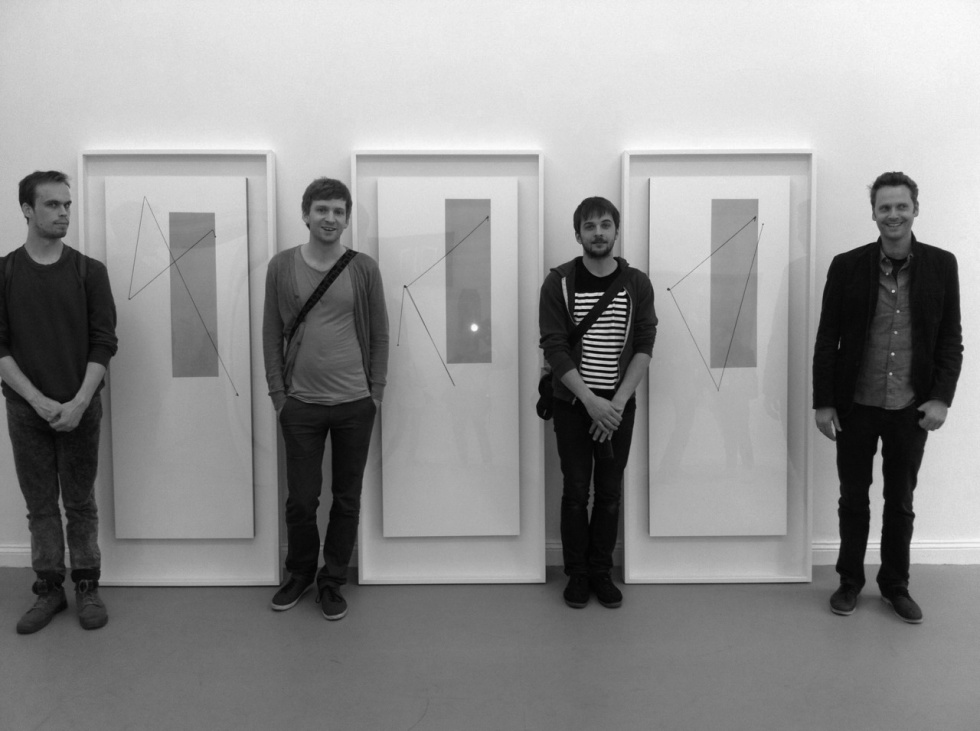
Peter Broderick, Ólafur Arnalds, Nils Frahm & Dustin O’Halloran at Stuart Bailes exhibition – Berlin 2011
***
On Erased Tapes
“There’s a fear factor for us – as a small label will we stand out? Will people get the few releases that we put out? For us it means so much that they do well for the artists. Even in London at the record fairs people are like, “Erased who?” We still feel like we’re not that known compared to other labels. As much as we have increased this past year I still don’t feel like we’re at a saturated point or a point where we can’t expand any more.”
“We had a visit from someone who works on the board for Association of Independent Music. It was something we’d never really thought about, considering it very business-y, in spite of their importance in giving independent labels a real platform against the majors. The core thing we remember from that meeting with AIM was he openly expressed his love for the label – a surprise!
The amazing thing was that he discovered the label without really knowing it, just finding the music bit by bit. He would listen to Peter and Ólafur and Nils and it took him two or more years to make the connection, discover other projects in-between, and all of a sudden realise there was a name to it; that it was Erased Tapes. We loved that. We felt like that’s how I want to be remembered as a label.
The label isn’t more important than the artist – the artist always comes first for us. At the same time, it’s not just one artist, it is a collective. We need to be there for each other when times are not so good and to be able to say, “hey let’s do this and get excited about it”. If not then there’s probably no point doing it any more.
You’re good on your own but you’re better when you’re not alone.”
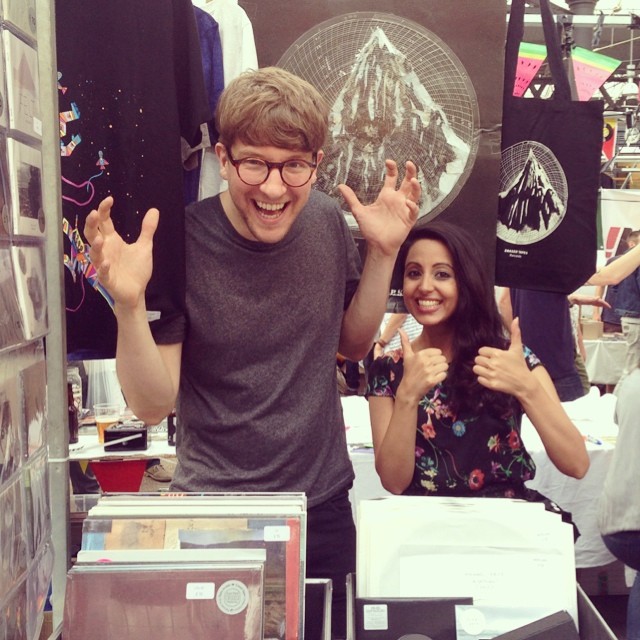
Robert Raths & Sofia Ilyas at the Independent Label Market – London 2014
***
Catch Nils Frahm perform a special live set from Dimensions Festival’s Opening Concert – more info here. Unmissable.